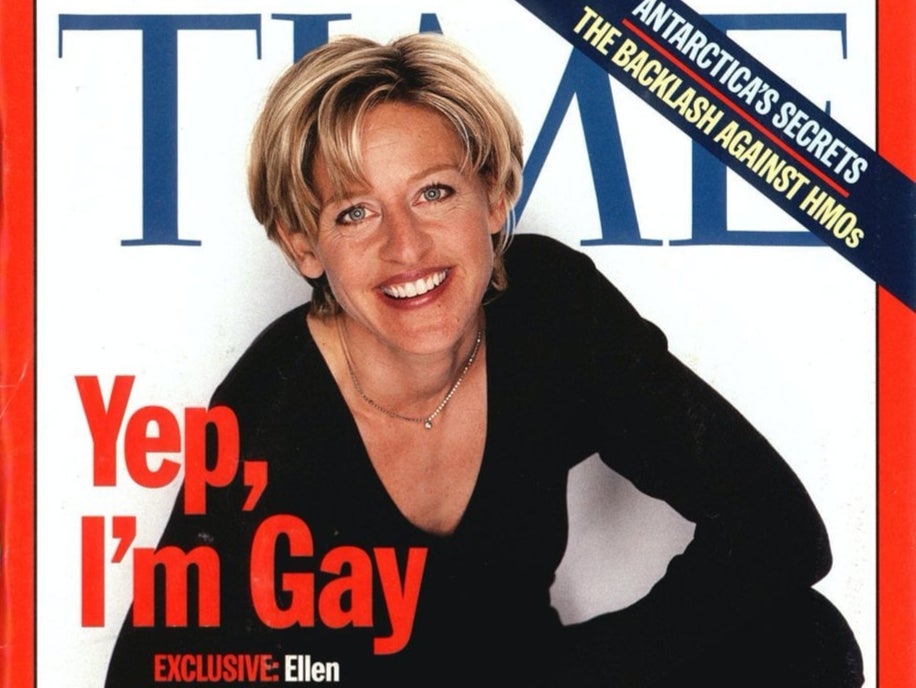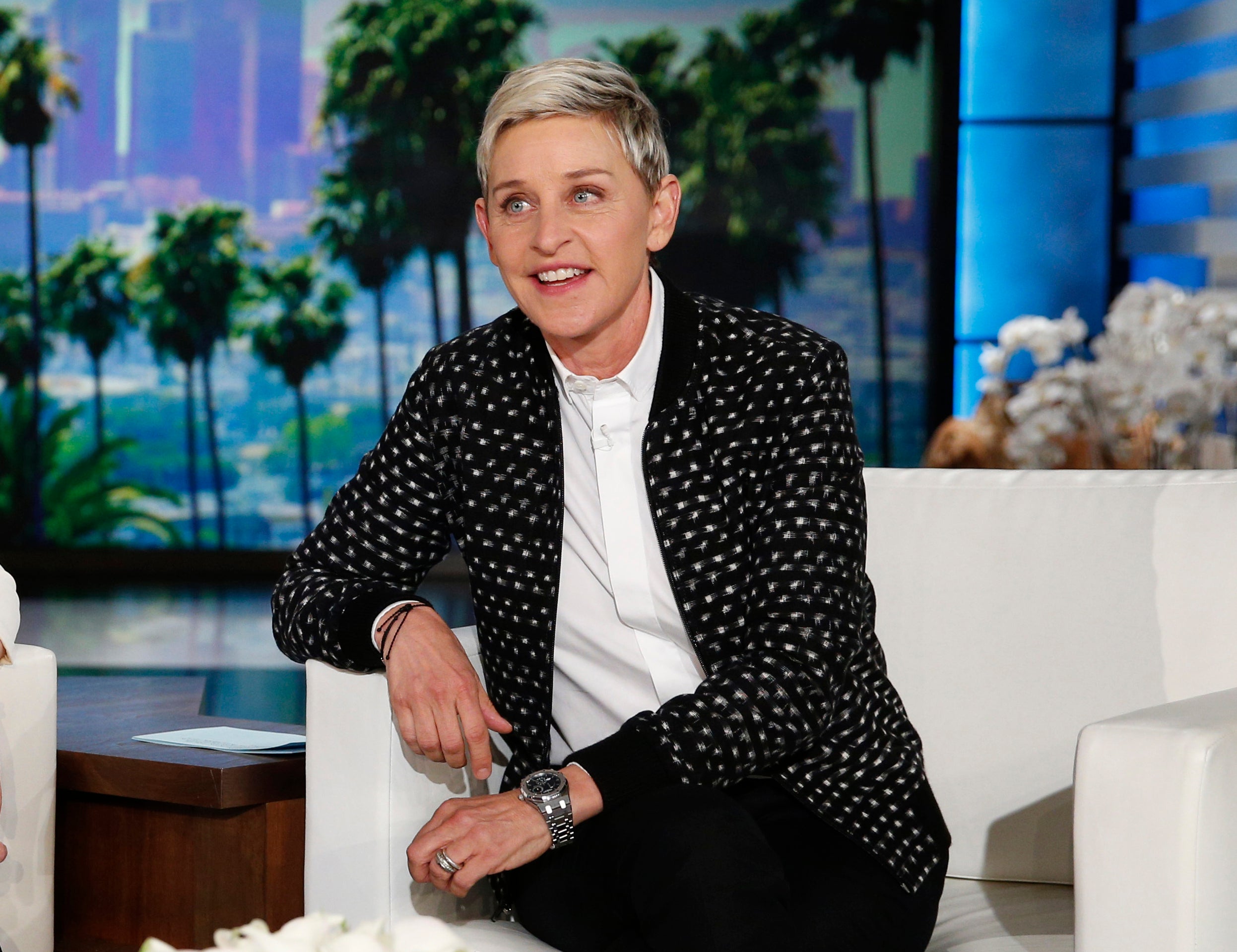What happened when Ellen DeGeneres came out in TIME magazine 25 years ago
The television star’s decision to come out changed the American landscape – but the fight for LGBTQ+ rights is far from over, Abe Asher writes

Your support helps us to tell the story
From reproductive rights to climate change to Big Tech, The Independent is on the ground when the story is developing. Whether it's investigating the financials of Elon Musk's pro-Trump PAC or producing our latest documentary, 'The A Word', which shines a light on the American women fighting for reproductive rights, we know how important it is to parse out the facts from the messaging.
At such a critical moment in US history, we need reporters on the ground. Your donation allows us to keep sending journalists to speak to both sides of the story.
The Independent is trusted by Americans across the entire political spectrum. And unlike many other quality news outlets, we choose not to lock Americans out of our reporting and analysis with paywalls. We believe quality journalism should be available to everyone, paid for by those who can afford it.
Your support makes all the difference.For many Americans, it remains one of the most memorable magazine covers they have seen in their lives.
Twenty-five years ago, on 14 April 1997, comedian and talk show host Ellen DeGeneres appeared on the cover of TIME magazine, dressed in black in front of a white background, under the words: “Yep, I’m Gay”.
“Ellen opened the closet door... for other out performers to live their lives openly and honestly,” former Gay Lesbian Alliance Against Defamation (GLAAD) president and Tempe mayor Neil Giuliano told PinkNews. “We know that with this kind of visibility comes understanding and acceptance.”
At the time, DeGeneres was one of the most high-profile figures in Hollywood to publicly come out – and the fallout was intense.
Speculation over DeGeneres’ sexuality began ramping up the year before, when it was reported that DeGeneres and other members of her writing team were locked in negotiations with ABC over whether her character on her ABC sitcom Ellen would be allowed to come out on an episode of the show.
On 3 March of that year, ABC announced that DeGeneres’ character on the show, Ellen Morgan, would in fact come out as lesbian on an upcoming episode. DeGeneres began suggesting that she might come out in real life, too,
By the time the TIME magazine issue was released on 14 April, the fervor around DeGeneres’ sexuality was at fever-pitch. Organisations like GLAAD rallied people to support DeGeneres, while a bevy of right-wing groups like the American Family Foundation pressured ABC not to air the episode on while Ellen’s character came out and sponsors not to advertise on it.
Several of those sponsors, including JC Penny, Johnson & Johnson, and Chrysler, decided not to buy advertising time during that episode. Wendy’s decided to stop advertising on the show altogether.
The extent of the corporate backlash against DeGeneres and ABC prior to the airing of the episode was indicative of the extraordinary backlash to come.

Despite conservative opposition, the episode in which DeGeneres’ character came out — titled “The Puppy Episode” to keep its contents secret — was a massive commercial success. Forty-two million Americans tuned in, a record for the show, and it ultimately won an Emmy Award for Outstanding Writing for a Comedy Series. DeGeneres also appeared on the Oprah Winfrey Show with her then-partner Anne Heche to discuss her decision to come out.
But while the episode was critical and commercial success, DeGeneres and others paid dearly for it. When DeGeneres came out, gay marriage was illegal everywhere in the United States, anti-LGBT+ discrimination laws were widespread, a majority of Americans did not believe that LGBTQ+ individuals were fit to be parents, and roughly half the country did not believe that homosexual relations between consenting adults should be legal at all.
It was perhaps unsurprising, then, that Ellen was quickly criticised for being “too gay” and was cancelled after just one more season. DeGeneres said that she fell into a deep depression after coming out, as she was “getting jokes made at my expense on every late-night show.” Laura Dern, who guest-starred on “The Puppy Episode”, later said that she lost work and needed a “full security detail” following the episode’s airdate.
Ultimately, DeGeneres’ coming out paved the way for more LGBT+ focused television characters and shows, with the likes of Will and Grace, The L Word, and Ugly Betty premiering in the following years. Dern eventually climbed to the top of the acting profession, winning an Academy Award, an Emmy Award, and four more Golden Globes.

DeGeneres’ career rebounded in a big way as well. After an unsuccessful return to television with a CBS sitcom in 2001, The Ellen DeGeneres Show became one of the country’s most successful and longest-running daytime talk programmes ever. It is set to air its final episodes in May.
DeGeneres’ career has not been entirely smooth sailing since her re-emergence as a mainstream star. She has been heavily criticised for her close friendship with President George W Bush, and two years ago, BuzzFeed News reported that DeGeneres presided over a toxic workplace culture on her talkshow. Similar allegations have followed DeGeneres throughout her career.
But the impact of DeGeneres’ coming out goes far beyond the entertainer herself. In 2016, DeGeneres was awarded the Presidential Medal of Freedom by President Barack Obama.
“At a pivotal moment, her courage and candor helped changed the hearts and minds of millions of Americans, accelerating our nation’s constant drive towards equality and acceptance for all,” the citation read.
DeGeneres posted on her social media channels on Thursday to commemorate her coming out, sharing a picture of the TIME cover and writing, “I remember coming out as gay on the cover of TIME magazine 25 years ago today. I don’t, however, remember saying ‘Yep.’”
Despite the significant progress that has been made towards justice and safety for LGBT+ Americans since 1997, many newly won rights and freedoms have come under attack in the last year. Over the last year-and-a-half, states across the country have introduced record number of laws targeting transgender rights. There is reason to believe that Republicans are interested in overturning the legalization of gay marriage as well.
In the current environment, the importance of DeGeneres’ courage 25 years ago stands out.
“This is just an issue about... not having anything to hide,” DeGeneres said on Oprah back in 1997. “No one can hurt me.”

Join our commenting forum
Join thought-provoking conversations, follow other Independent readers and see their replies
0Comments